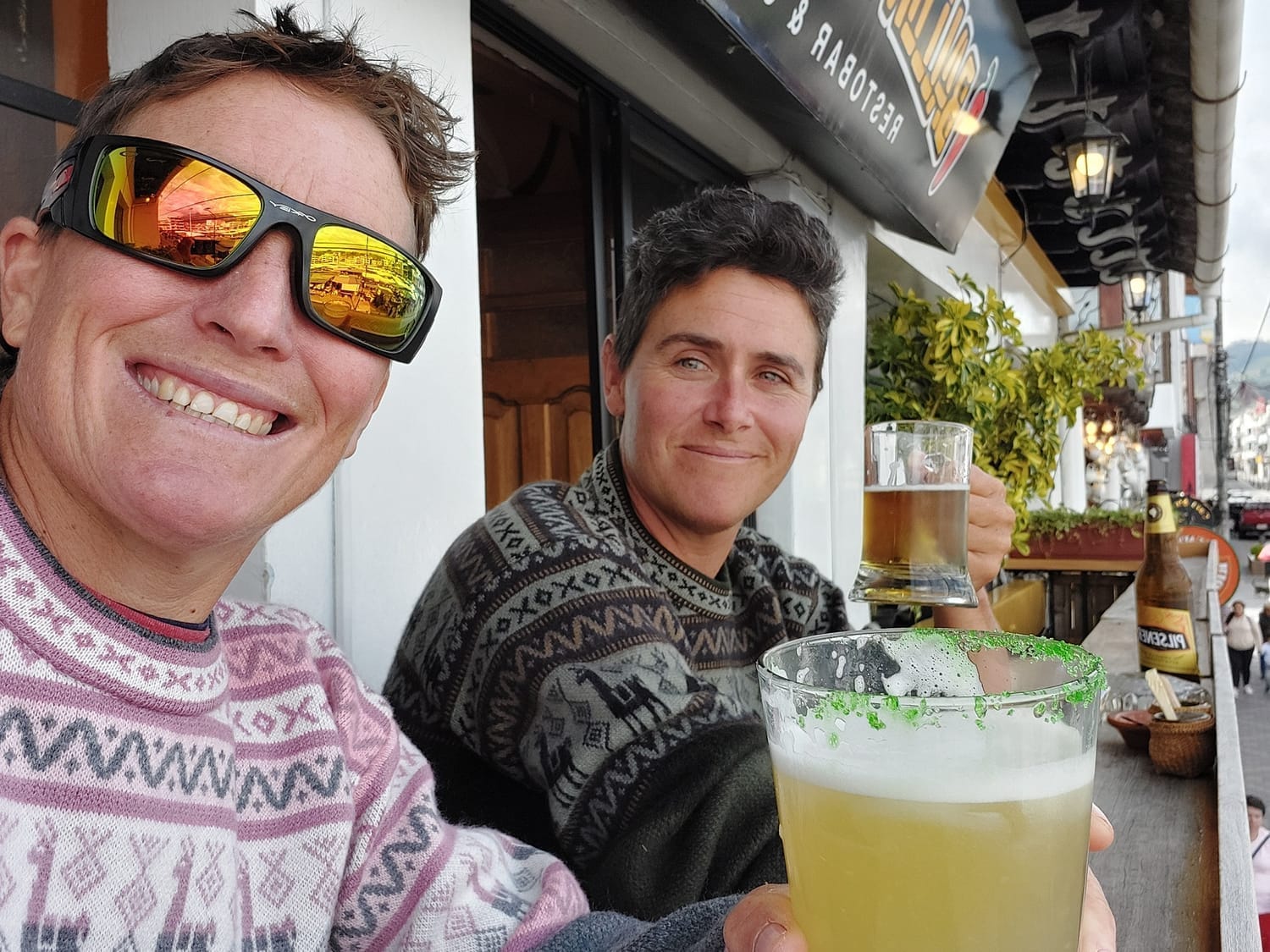San Miguel de Piquer to Otavalo
Defining our adventure through steep learning curves.
San Migue de Piquer to San Geronimo
The lmorning light filtered through the tent as we brewed coffee and prepared fried rice, the aroma mingling with the crisp air. Over breakfast, we dissected the previous day's missteps—the missed turn, the decision to press on despite the weather.
We’re no strangers to wild weather or hard yakka. We’ve paddled swollen rivers, tramped frozen ridgelines, hunted in conditions that would make most folks stay in bed. But yesterday? ?
We missed a turn, sure — that happens. But when the rain came down like nails and the cold started sinking past skin, into the bones… that’s when the red flags should’ve gone up. Instead, we pushed on. Slower. Soggier. A little stupider by the kilometre.
We talked it through, stripped of ego. We were dulled by cold, and decision-making turned to mush. We’d had options — turn back to town or chuck up the tent and wait it out — but neither of us said it out loud. We both knew we’d flirted with the line between “toughing it out” and "a detrimental situation".
We resolved to be more attuned to our instincts, to prioritize safety over plans. A mental note was made to acquire additional thermal layers and a thermos for warm drinks on cold days. The road ahead was unpredictable, but our commitment to each other and to thoughtful decision-making was reaffirmed.
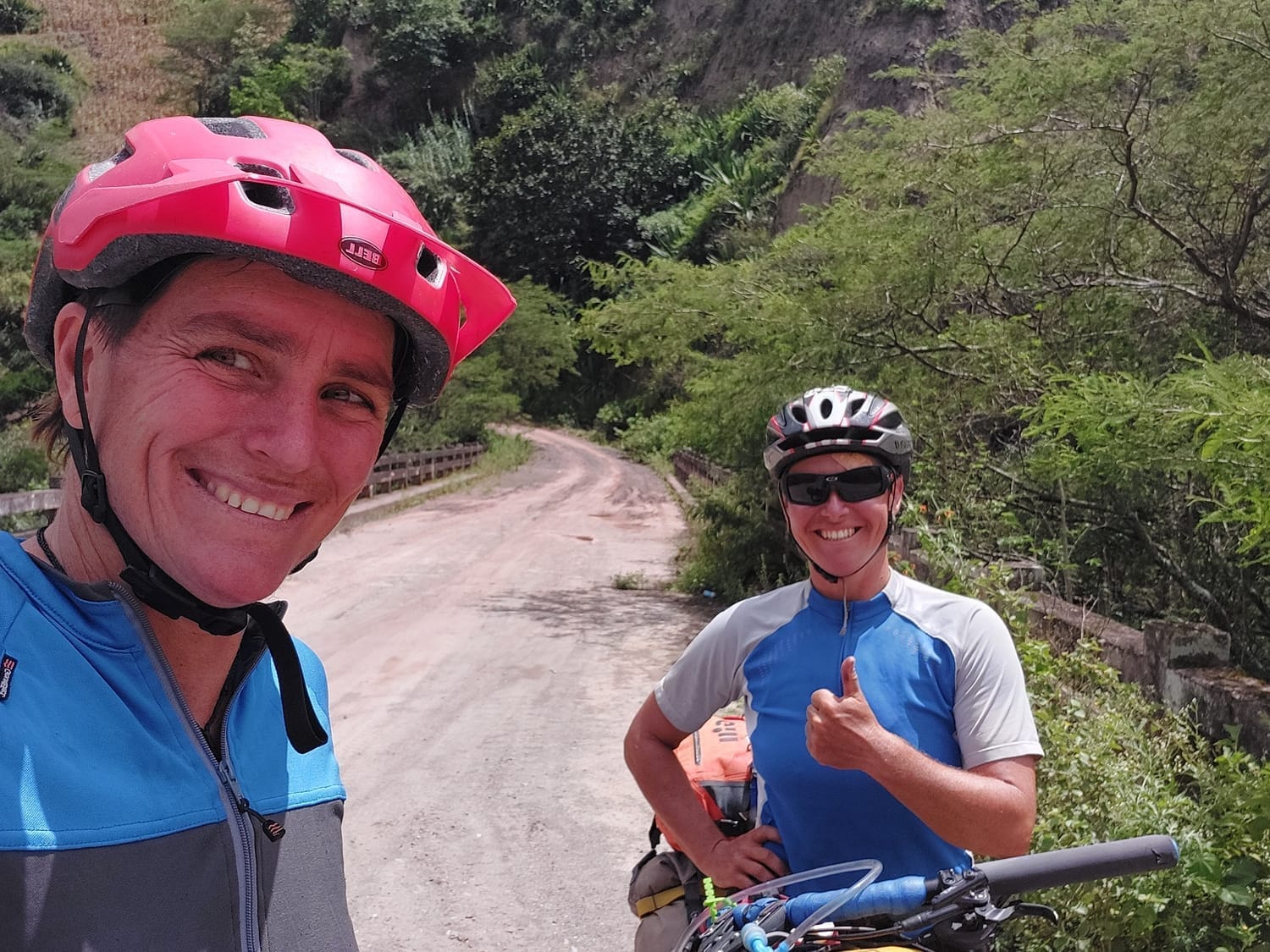
The wheels rolled out smooth. The road dropped into a canyon that looked like it had been painted — terraces of green, dotted with trees shaped by water and time. We hooned along easy undulations, the sun giving us a slow nod of approval.
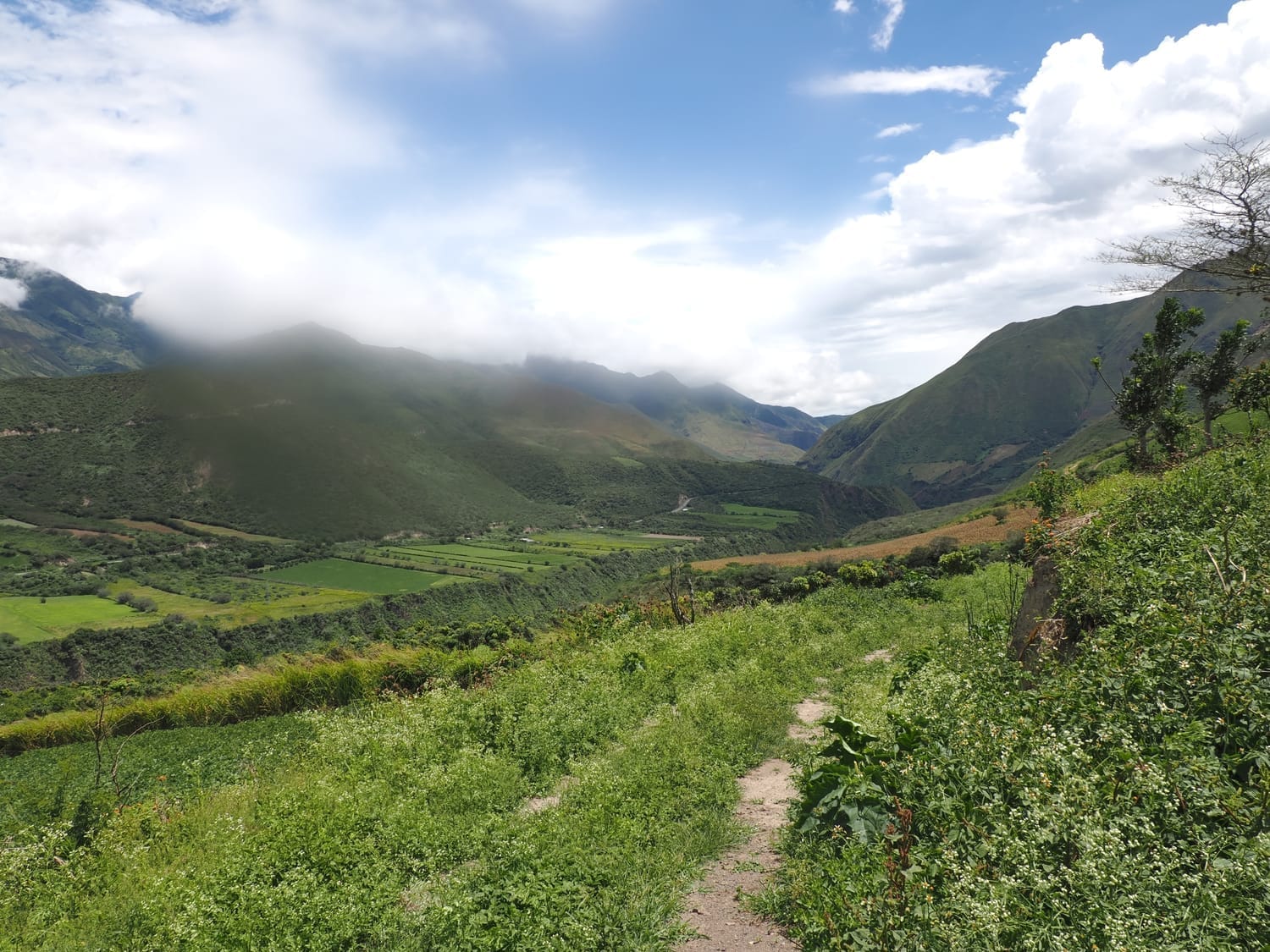
Then Maree pulled up beside a local woman standing by the road. They chatted in broken Spanish and hand gestures. One word cut through everything: peligroso — dangerous.
That one stuck in the air like a bee in a jar.
We couldn’t get the details — dangerous how? But the warning hung heavy. We were already too far in to turn back, and pushing forward felt like walking into fog without knowing what’s on the other side. We didn’t talk much after that. Just rode, alert, heads on a swivel, that nervous tension pressing down on our shoulders.
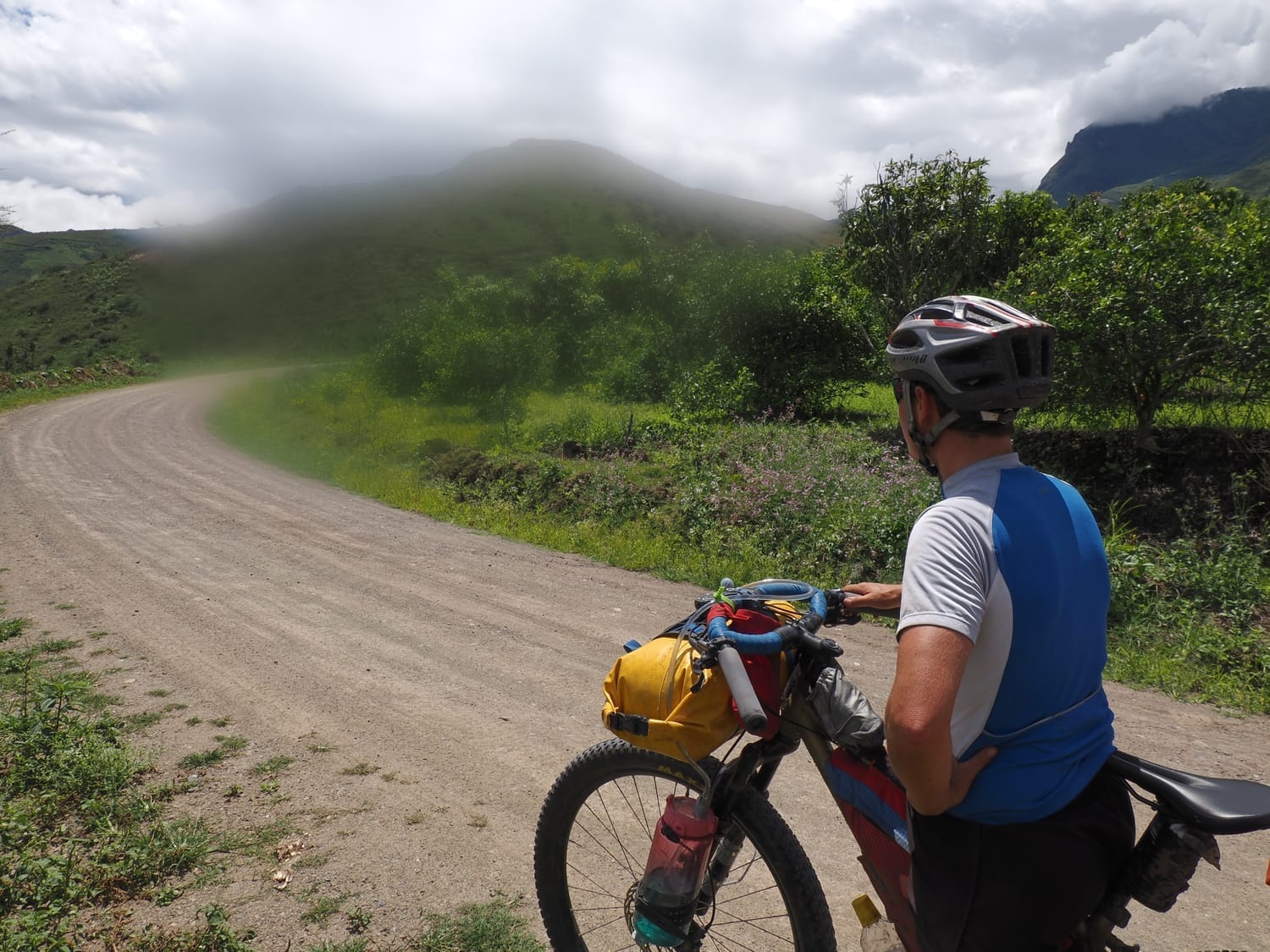
Then we turned a corner — and found magic.
A dirt road that was once a railway, now reclaimed by nature. A roaring river to our left, forest arching overhead, dappled light dancing across the trail. Birds flitted like confetti, butterflies teased our handlebars. I found myself humming — something out of a Disney movie forest scene. I was fully caught in a spell
'Phhhhsssssssst'.
The hiss of a puncture. My spell was broken!
Maree’s back tyre again. I swore softly, pulled over, and we got to work. The tubeless plugs worked a treat. Ten minutes later, we were back on the trail, like nothing had happened.
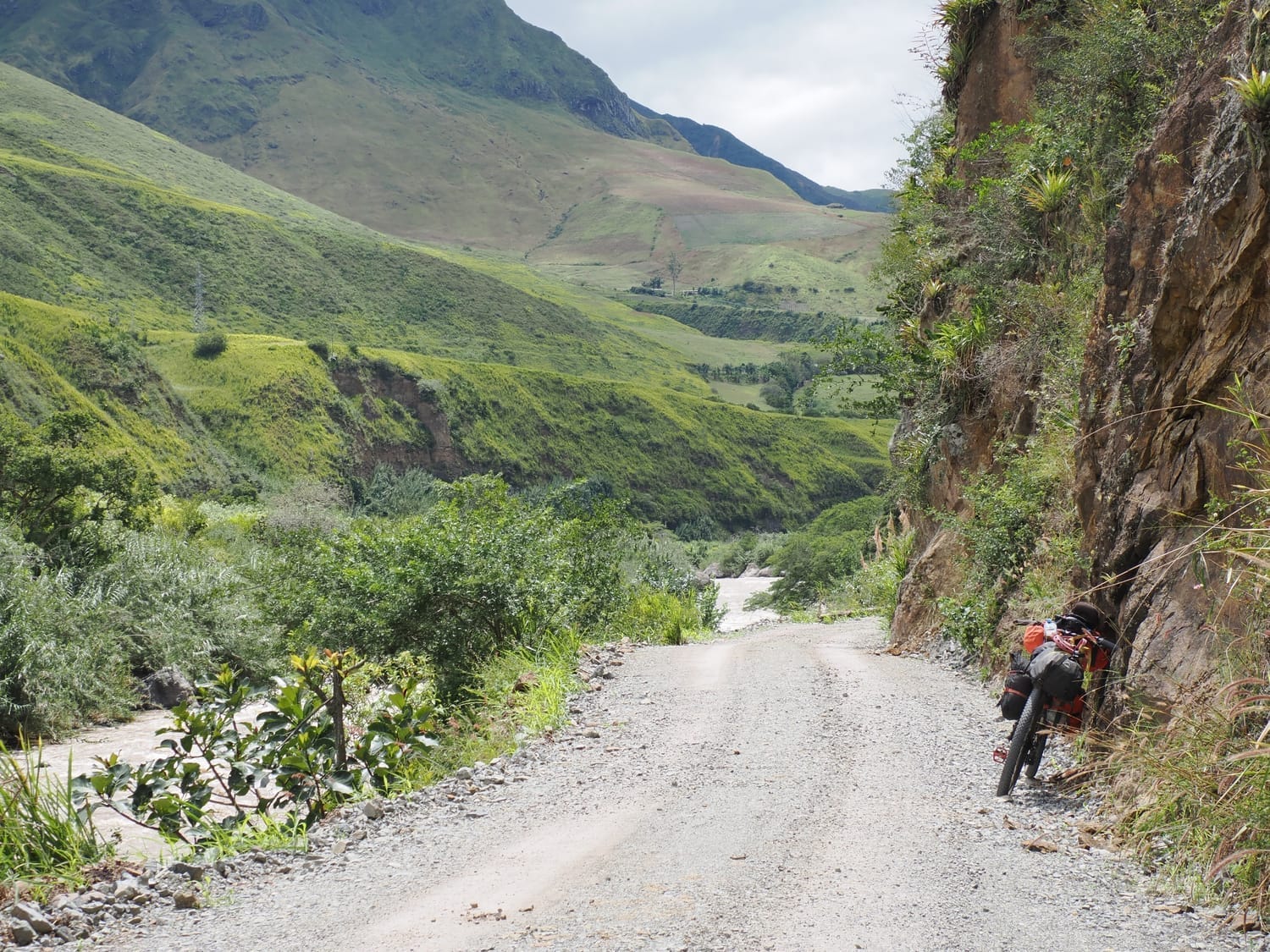
The spell was broken again at a bridge we crossed that lead us to a grunty hill, sweat cutting paths through the dirt on my face.
“I’d murder a cold Colombiana right now,” I puffed.
And like it had been waiting for the cue, a little roadside shack appeared at the top. Cheesy arepas and cold juicy mango jugos. We parked up, tore into food like we hadn’t eaten in days, and let ourselves just be.
Just four ks down the road we rolled into a dusty little town, San Geronimo. We found Hosteria San Geronimo and dropped anchor. No more dust, no more danger. Just a bed, four walls, and the echo of a day well earned.
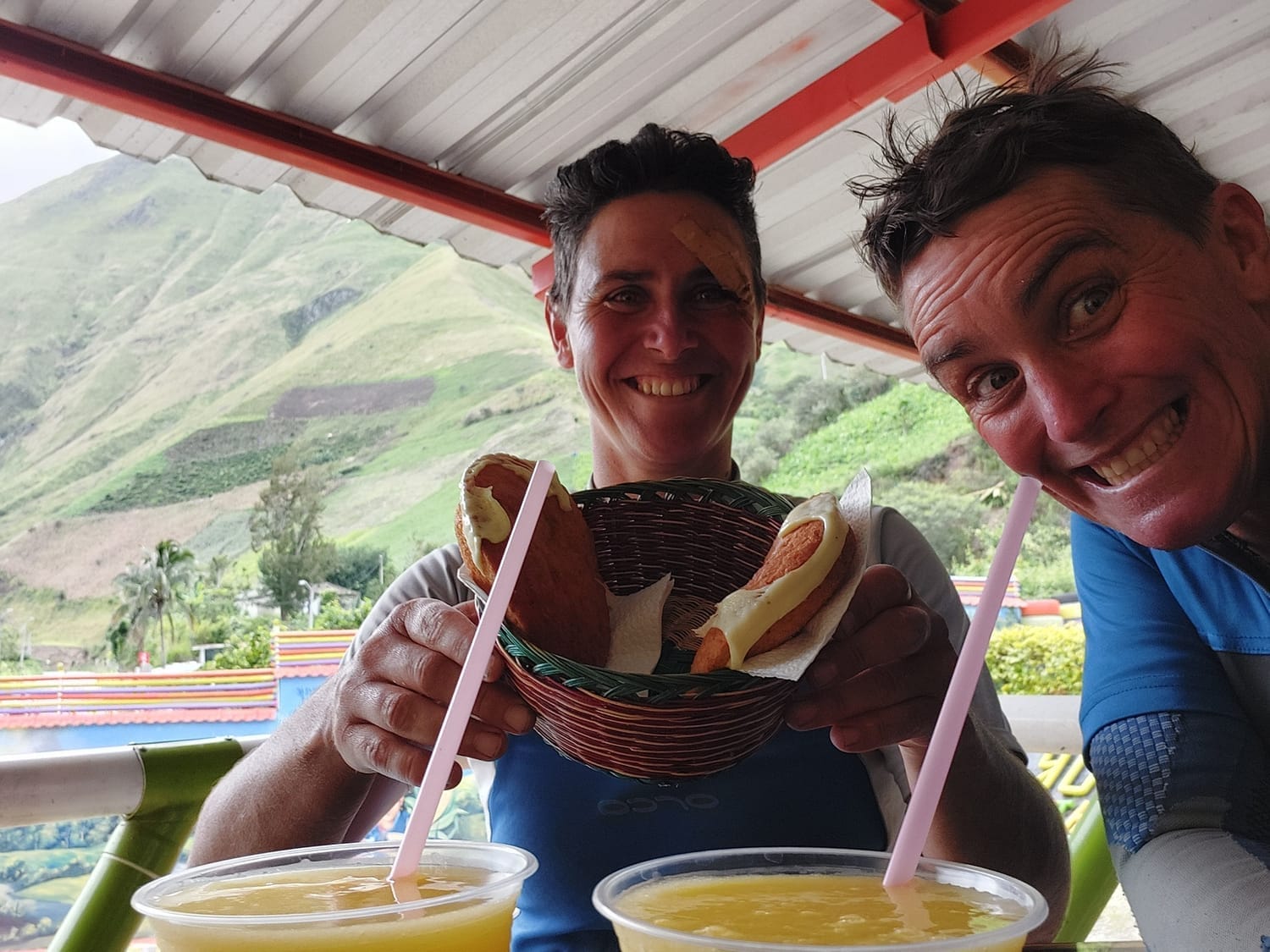
San Geronimo - Marees Sick day
“How you feeling this morning?” I asked, barely above a whisper.
Last night, Maree had mentioned a scratch in her throat and headache. The kind that carries a quiet threat. Now, in the soft light of morning, her reply came like gravel rolling down a rusty tin roof.
She coughed—deep, hoarse, and heavy. The kind of cough you’d expect from an old bloke who’d chased too many whiskies and rolled his own since he was twelve. “Can I rest a little more?” she croaked, her voice barely clinging to the vowels.
It was just past 6 a.m. The world outside our hotel window was grey and still, the sort of morning that made you grateful for a roof, and the kind of silence that didn’t demand too much from you.
I slipped quietly out of bed and fired up our trusty camp cooker—right there in the hotel room. Naughty, maybe. But practical? Bloody oath.
By 8 a.m., the hunger had crept in. “Babe, I’m off to get some breakie—want me to bring something back?” I asked.
She blinked slowly and mustered a tired grin. “Nah, I’ll come with you.”
We sat under dim lights over huevos, rice and polo, her pale face a quiet map of fatigue. Between bites, we agreed—pushing on today would not be advantageous to Marees welbeing. Better to hole up and let the cold run its course. So, we checked in for another night at
Hostal San Geronimo.
Maree crawled back into bed, wrapped herself in every blanket she could find, and surrendered to the sickness. The room echoed with her soft snores, occasionally broken by those gravel-pit coughs.
I stretched out on the spare single bed, a quiet observer of the world beyond the glass. Rain draped itself across the windowpane, steady and heavy, while birds danced through the branches outside, plucking fruit and flashing colour like tiny fireworks.
The day passed like a slow river—silent, reflective, and just what we needed.
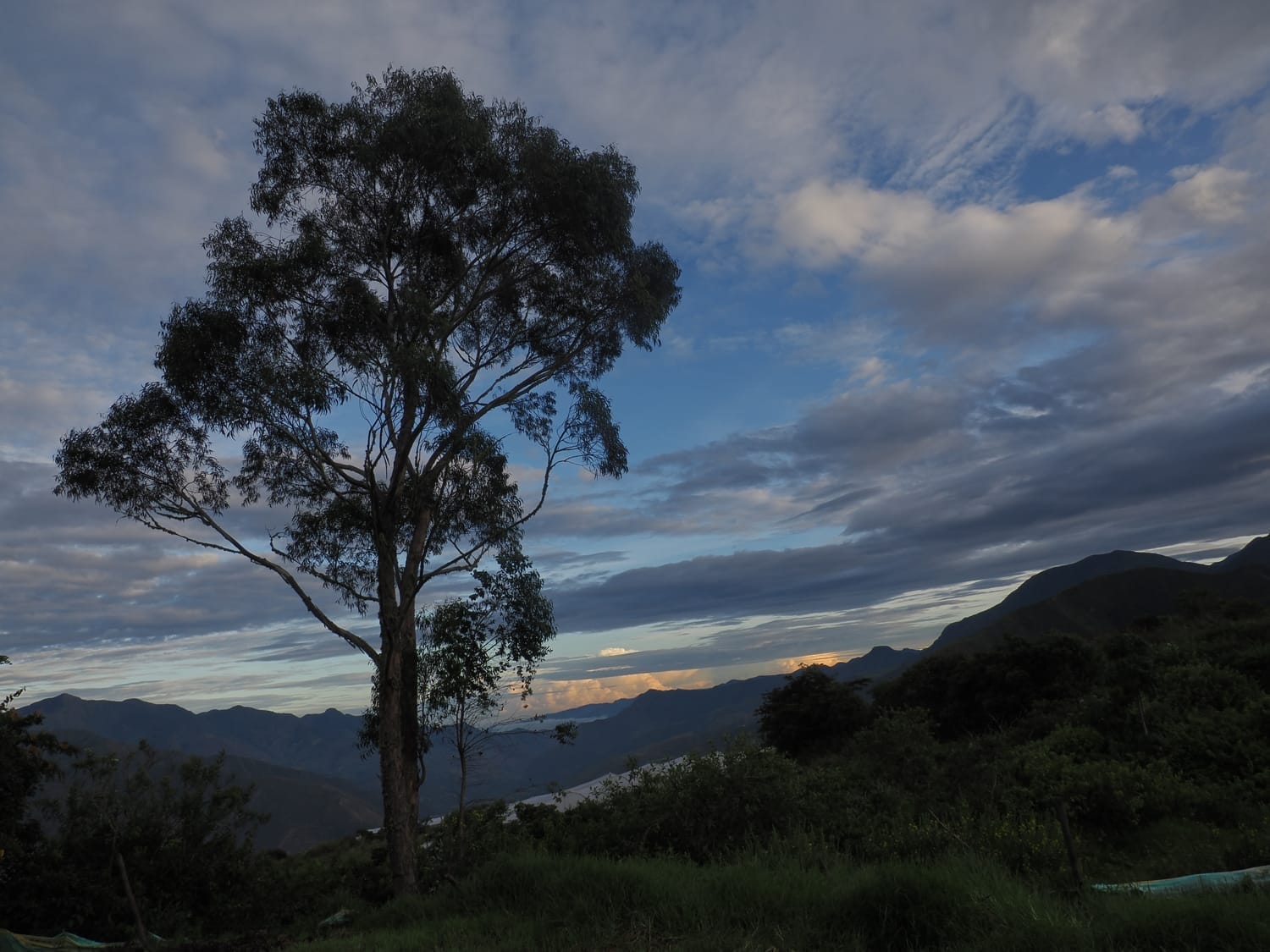
San Geronimo to Motocrosspark Campoalegre
Maree reckoned she was good to go this morning. She still looked pale around the edges, but when she said she was ready, I trusted it. She’s stubborn like that.
We packed up, swung a leg over our bikes, and pointed them back toward the café where we’d had those life-changing arepas and jugos a couple days back. The thought of those cheesy golden pockets and a cold mango jugo hit was enough to put some pep in our pedals. Plus we knew she did a good coffee!
The main road rolled out ahead of us, soft with morning mist, and surprisingly quiet. Every few minutes a vehicle or two would pass, but mostly it was just us and the hum of tyres on tarseal.
The ride was a steady uphill smattered with undulations that didn’t break you all at once, just slowly wore you down.
Maree still wasn’t at her best, you could see it in her eyes, in the way she pedalled—like she was hauling her whole immune system up every hill. I stuck close, pumped out some tunes to keep the vibes up. She’s a battler, but even battlers have their off days.
We traced the other side of the valley from where we’d come a few days ago, and the view opened up—rolling emerald hills despersed with land slips, cows chewing lazily and clouds lounging in the tops like they had nowhere better to be. It was all kinds of magic.
At Cuambo, we pulled over hoping for a hot brew, but ended up with Coke and chippies. The shop might’ve lacked in caffeine, but the locals made up for it in warmth. One was really interested in us and had us pose for photos with her.
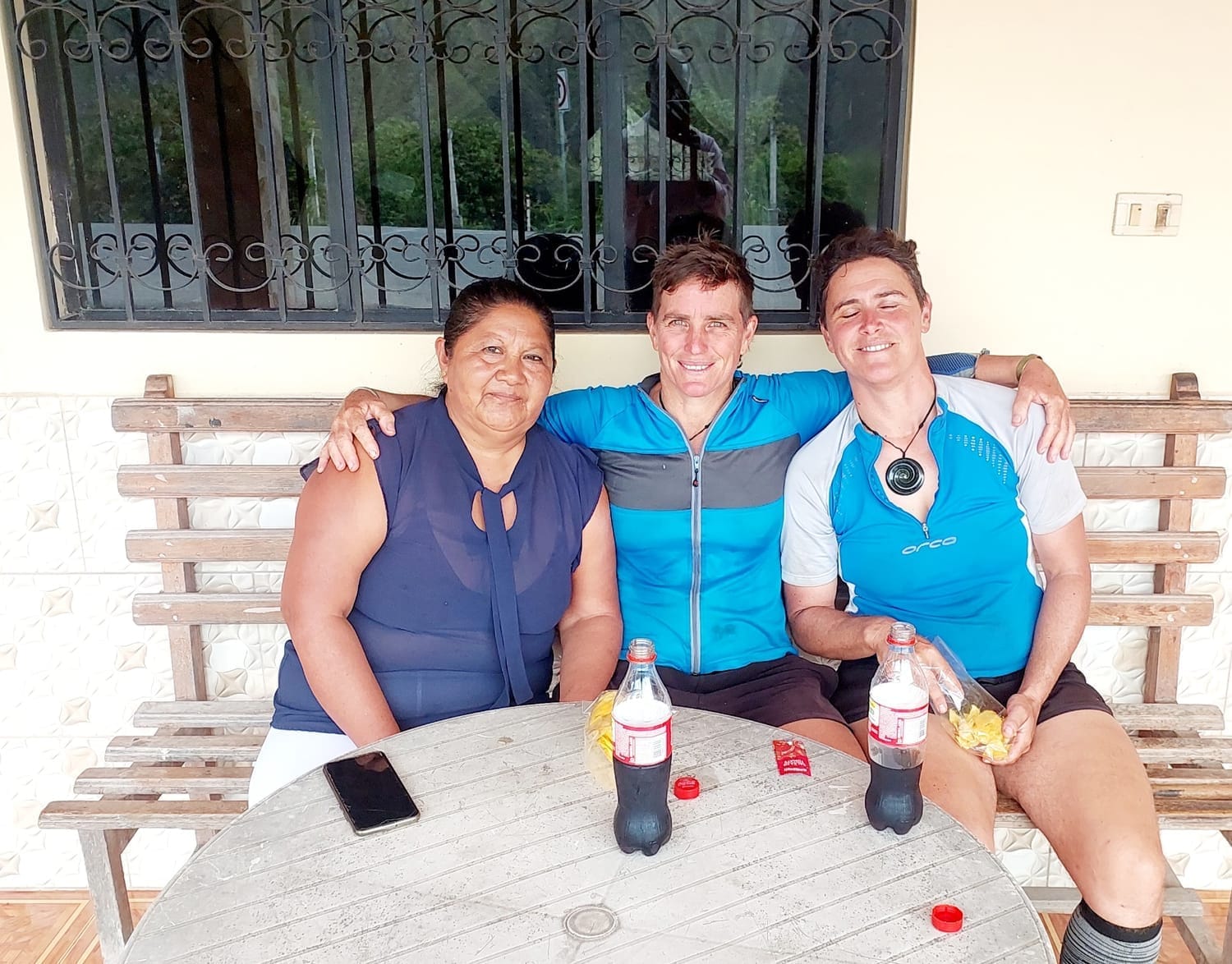
We kept grinding, slow and steady. The town of Salinas came and went—a ghost of a place, really. One lone restaurant and not much else. The next town, according to Google, was another 10 k’s down the line and looked like it might offer some accomidation options.
Maree gave the nod to carry on, but as soon as we started pedalling, I knew she was done. Her energy was gone. She was running on nothing but sheer will.
Then, as if Ecuador herself had our backs, we struck gold again, Motocrosspark Campoalegre, it looked like a place we could pitch our tent. The gate was locked but we were able to wave at the grounds keeper. , He made a call, then welcomed us in like old mates. He led us to a massive football field and said we could camp there. No fuss, just kindness.
As I stirred dinner on the camp cooker, Maree curled up with a book, her face a little less grey than it had been this morning.
Then came the Utes. Doors slammed, kids spilled out, laughter cracked open the stillness. Mini motorbikes were unloaded and buzzed around the field as the parents caught up nearby.
Our quiet bush camp had turned into a full-blown motocross party.
Life out here never ceases to surprise. One minute you’re struggling to find water, the next you’re front row to a spontaneous community gathering in the middle of nowhere.
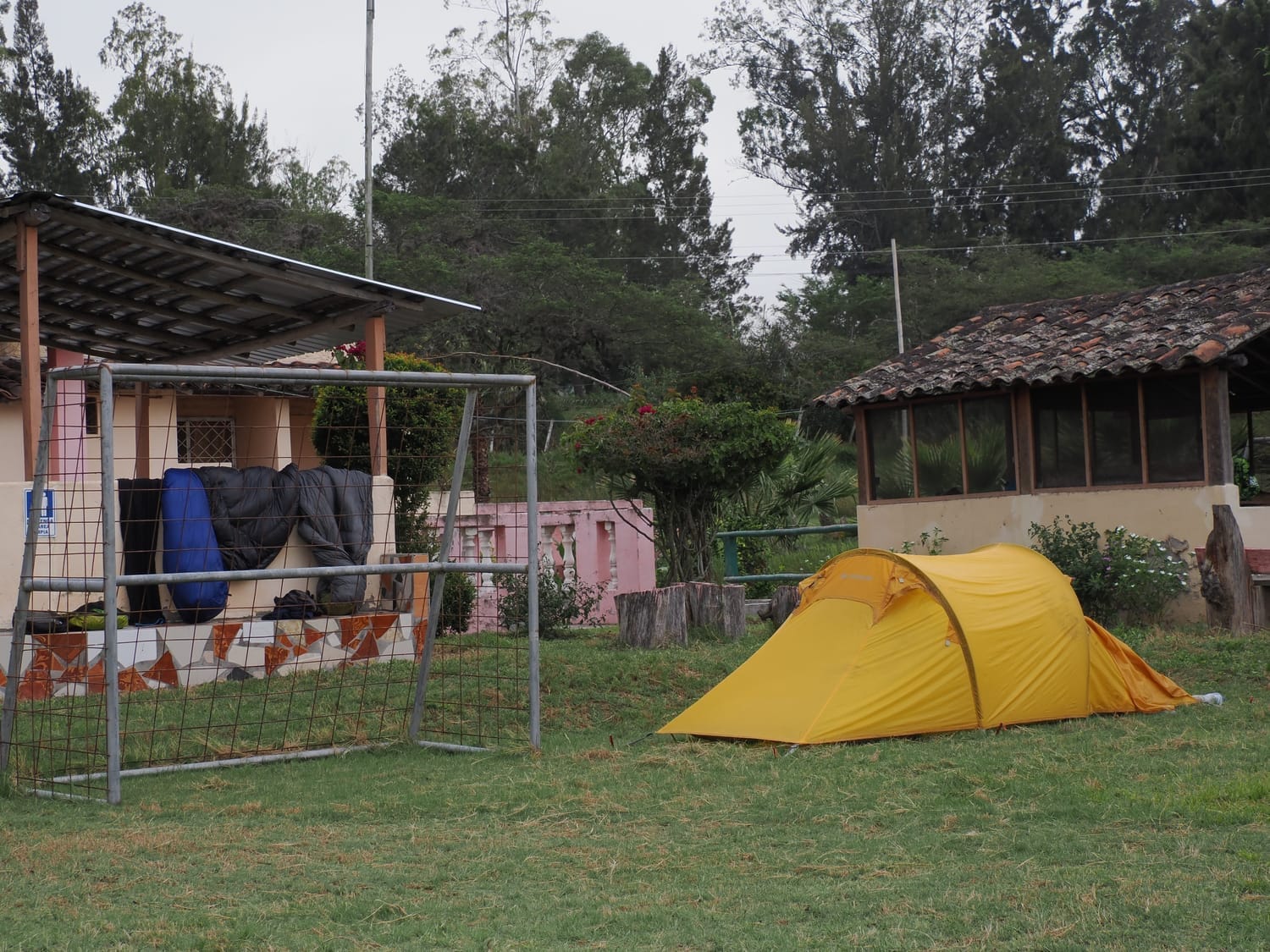
Motocrosspark Campoalegre to Urcuqui
The morning cracked open with golden light filtering through the cane fields, painting everything with a sleepy glow.
I hit the pedals like a dog off the chain, weaving through the green tunnel of sugarcane, feeling the wind whip my face and the burn build in my legs. For a moment, it was just us and the hum of rubber on dirt. But the illusion didn’t last.
The road leaned back and dared us to climb. No playful dips or lazy flats—just an endless incline that sucked the buzz right out of my system. By the time we reached Tumbabaro, sweat was leaking out of places I didn’t know could sweat, and the thump behind my eyes had turned into a steady drumbeat.
Maree and I huddled in the shade, each nursing a bottle of something cold, legs twitching, lungs heaving.
Then came the sweet mercy of downhill. We glided into a gully with that weightless joy you only get when gravity finally gives you a break. But joy’s a fickle mate. The next climb hit like a slap from the mountain itself. Somewhere in that climb, my body downed tools. That slow, creeping ache I’d been trying to ignore for days kicked the door in.
Maree’s cold had clearly found a new home—and it was squatting in my head, my chest, my bloody joints. Love her to bits, but she didn’t need to be that generous.
By the time we rolled into Urcuquí, I was a ghost on a bike. We stumbled into another street market, a full sensory assault—spices wafting, vendors shouting, fruit stacked like art, and strangers grinning at the sight of two dusty gringos on bikes. I shuffled through the crowd like a zombie in bike shorts. The world was moving too fast, too loud, too colourful.
I shoved down some rice and meat just to say I’d eaten, then dragged myself to the farmacia to play the charades game of guess what I have and what I need. I have no idea what I bought—could’ve been flu pills, could’ve been horse tranquilizers. At that point, didn’t care.
The cherry on top? Ice cream. Cold, creamy hope in acouple. I slumped in the corner of the shop while Maree zipped off to find us a bed. My hero. Again.
She came back, grinning. Sorted. We wheeled my sorry carcass to a warm bed in a small room where I could sweat out whatever jungle bug was crawling through my veins.
Now I’m horizontal, drugged up, and hoping tomorrow shows a bit of mercy.
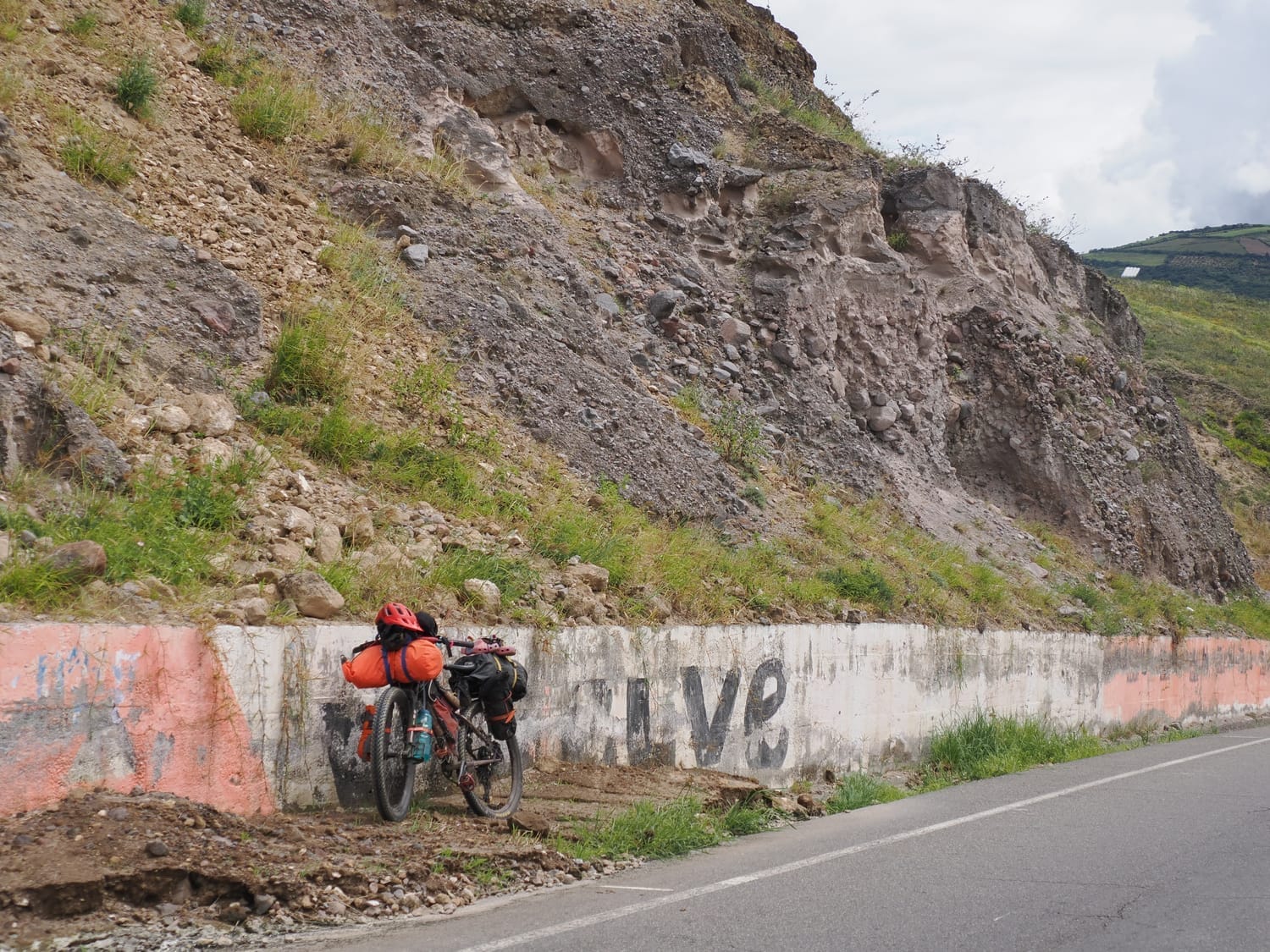
Urcuqui - My sick day
So today was my turn to be woken with sweet whispers from Maree.
“Babe… it’s seven o’clock. You should get up soon.”
I cracked one eye open and groaned. “We don’t have to check out till eleven…”
My voice was hoarse, throat thick with whatever bug had moved in overnight. “Can I just sleep a little longer?”
She gave me that half-smile — the one that says, you’re clearly useless, but I love you anyway — and let me be.
I summoned just enough energy to roll over, fumble a horse-sized cold tablet into my mouth, and chase it down with a lukewarm gulp of water. Then I passed out again, deep and heavy, like I’d been dragged underwater.
Sleep came in waves. The restless, feverish kind. Half-lucid dreams of switchback roads and glowing jugos. Somewhere in the haze, I could hear her moving around — the zip of bags, the quiet shuffle of sandals across tiled floor. Maree doesn’t hover or fuss. She just does. Stalwart, steady, quietly badass.
I came to again around nine. The sun was already streaming in through the curtains, heating the room with that dry morning warmth that always feels harsher when you’re crook. I croaked a half-response when she asked how I was doing.
“Still rooted.”
Without missing a beat, she kissed my forehead. “Right. I’ll go book another night.”
And that was that. She picked up the load so I could stay horizontal. That kind of love — it’s worth more than any mountain view.
The day passed in a fog of fitful naps and warm blankets. Maree ducked out for supplies, came back with juice, and let me rest. She did her own wandering through the town — checked out a few corners, talked to a fruit vendor who gave her an extra banana “for the sick boy,” then came back and curled up with her book.
I’d surface now and then, have a sip, say a few croaky words, then sink back into the pillows. And in between the haze and the hurt, I felt lucky — not just to stop and recover, but to have a partner who knows when to push, and when to just let you be a mess in peace.
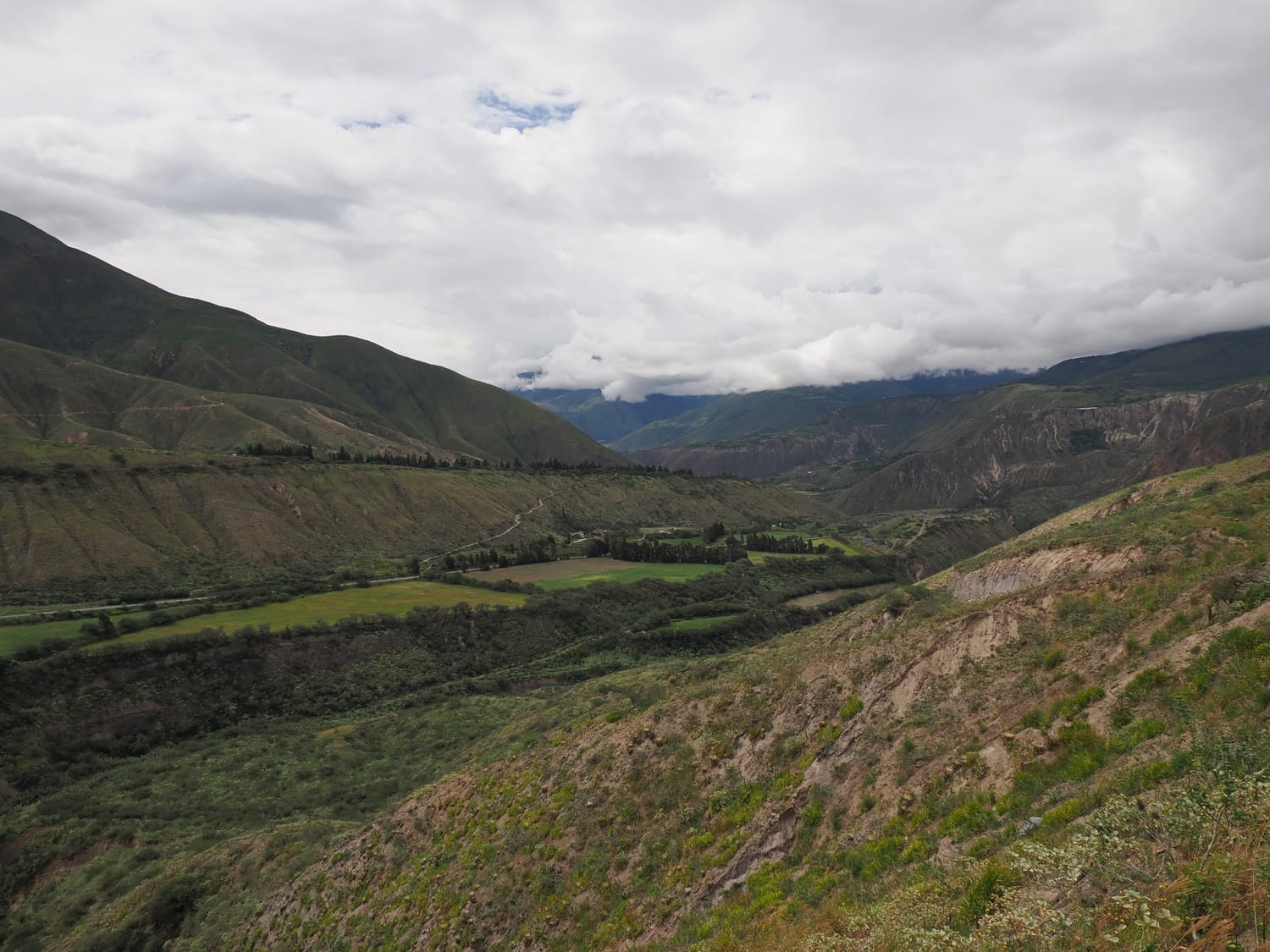
Urcuqui to Otavalo
The rhythm of the morning — slow and steady, a quiet grind through the Ecuadorian countryside. No heroics. Just forward motion.
We rolled into a Imantag and parked up for a snack. My appetite was still sulking, so I settled on one of those jelly cups you only ever see at corner stores — bright red, wobbling, with a blob of fack cream on top. The cream didn’t appeal, but it made one scruffy dog’s day. Maree tucked into two croissants, and we both sat in the shade, chewing slowly and watching the day unfold around us.
From there, the road to Cotacachi turned to cobbles — broken, janky, tooth-rattling cobbles. The kind of surface that makes your bike feel like it's riding a jackhammer.
And while the map showed it as flat, reality had other plans. The road undulated with just enough bite to keep the legs honest.
But the landscape made up for it. Green fields stretched out on either side, stitched with fences and lined with low trees. It felt like riding through a painting someone had half-finished, still soft around the edges.
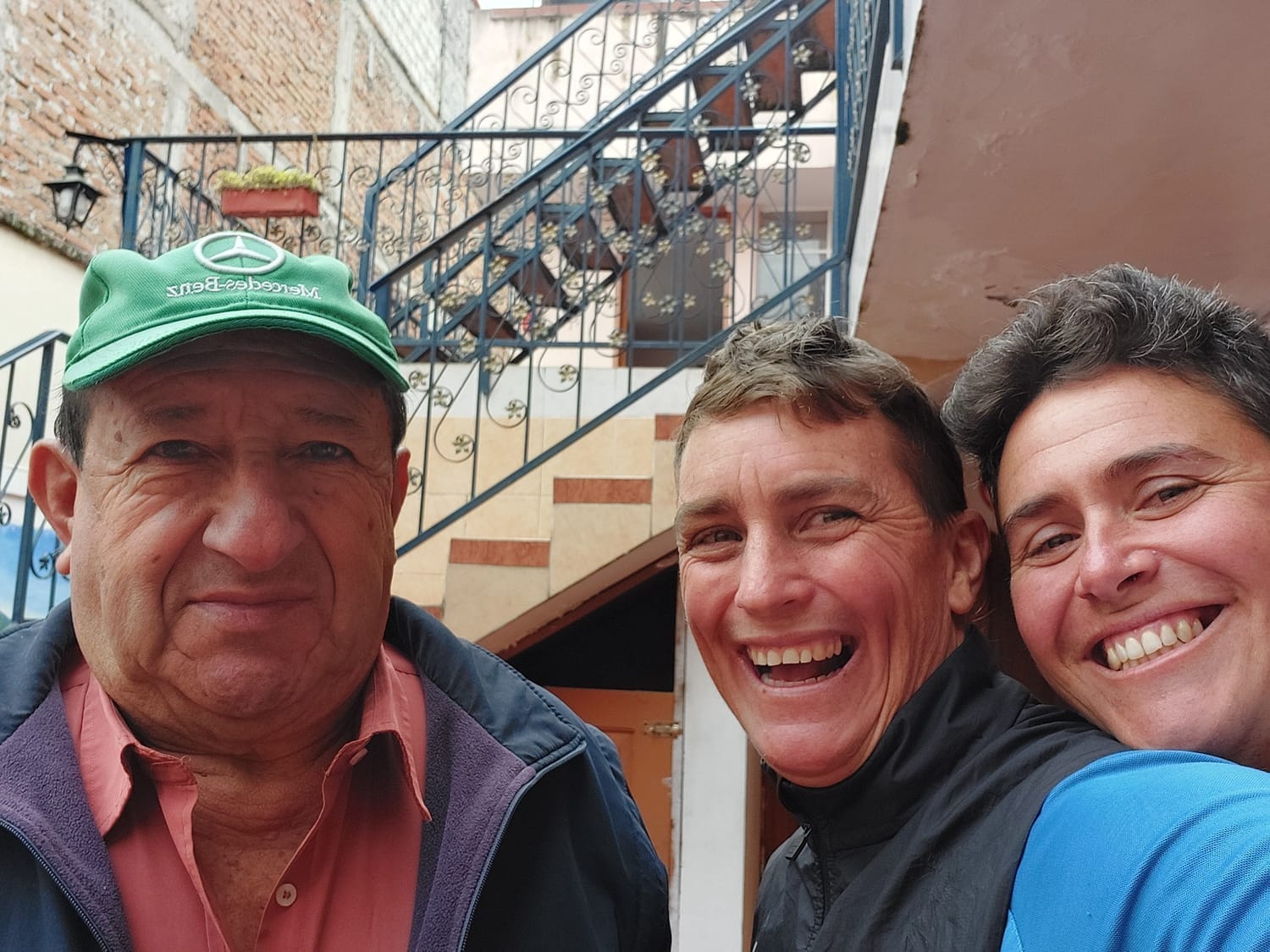
Then came Otavalo, our destination for the day. A town tucked up against the hills. We found a hostal that oozed character, rustic charm, and a friendly grandad. It had way more soul than the flash hotel from the night before, and I loved it instantly.
As soon as we dropped our gear, my body waved the white flag. Sore throat, aching limbs, a head that felt like it was filled with wet sand. But my hangriness was imminent, we need to go out to suppress it. So I peeled myself up, and we wandered to the local market in search of food.
But instead of food, we found wool. Row after row of stalls stacked high with alpaca jerseys, ponchos, and Christmas-in-the-’80s-looking jumpers. After our near-hypothermic incident a few days back, we’d promised ourselves some warmth insurance.
So we tried them on. Me and Maree, side by side in matching alpaca jerseys, looking like a couple of rugged-up lesbians on holiday. We didn’t care. We felt toasty. We felt prepared.
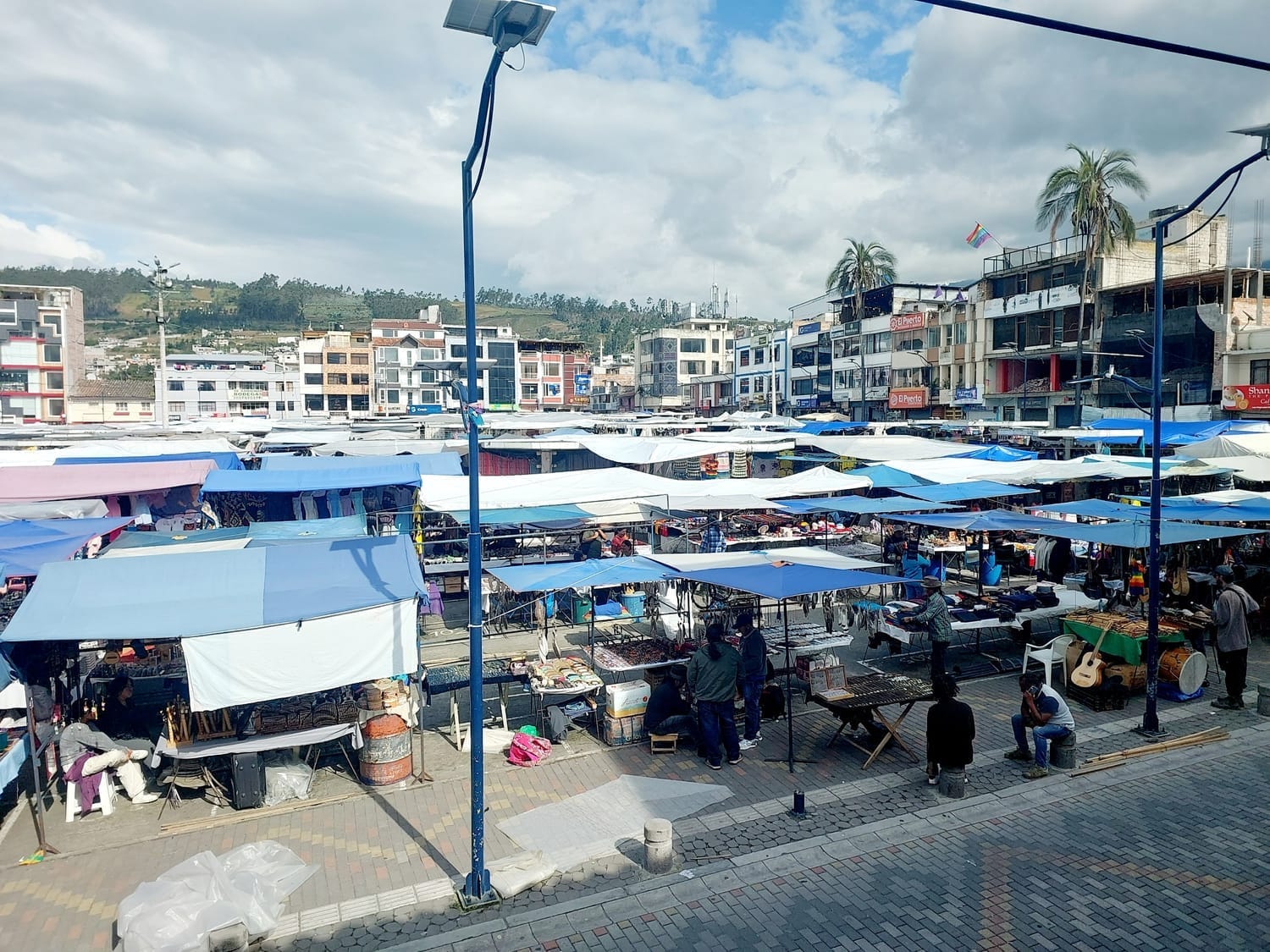
Eventually, hunger pulled us off the woolen trail, and we found a place to eat that had a hint of polish — about a dollar more than we’d usually spend, but worth it.
Maree ordered a beer. I, needing comfort more than buzz, asked for a lemonade... and a shot of whiskey.
What I got was the most generous shot I’ve ever seen — four fingers of amber gold in a full tumbler. I tipped it into my lemonada, swirled it like a bush chemist, and sipped it like medicine.
Food down, whiskey-lemonade down, 7we walked back to the hostal, arm in arm, warm in more ways than one. I took two fresh paracetamol, sucked a lozenge, and disappeared under the covers like a bear going into hibernation.
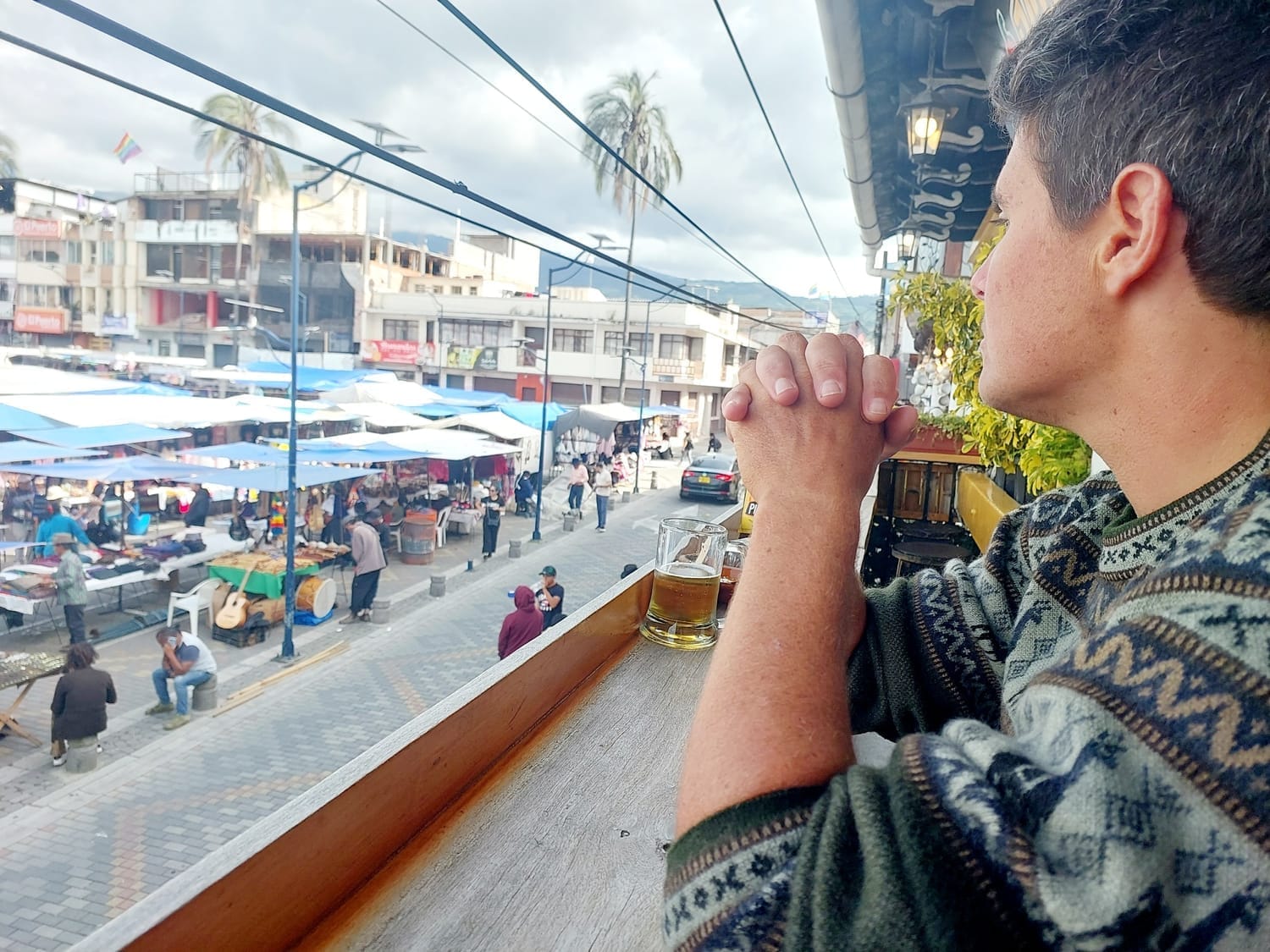
Otavalo - Sick day again!!
“Are you both twins?”
The question caught us mid-step as we wandered the streets of Otavalo. It came from an elderly American woman with a gentle smile and the kind of voice that suggested she’d once been a schoolteacher.
Twins.
Not sisters. Twins. That was new.
Sure, people often mistook us for sisisters. But twins? That was next level. Maybe it was the jumpers. Maybe it was the way we moved in step now, finishing each other's complaints. Or maybe it was just the energy we carried, equal parts tired and alive.
But why were we even walking around Otavalo on a day we were meant to be biking toward Quito?
That, my friends, was the headfuck of the day.
I’d woken up feeling like I’d slammed into a concrete wall at 80 clicks. My throat croaked with frogs throwing a rave, and my chest had the weight of a elephant on it.
Another morning, another wave of "I should be biking. It’s a bikepacking adventure. That’s what we’re here for."
But I couldn’t ignore what my body was shouting.
Rest. Heal. Slow the hell down.
So there I was, pacing the internal tightrope between expectation and reality. Between what the adventure should look like and what it actually is.
And here’s the truth I came back to: this is our adventure. Mine and Maree’s. We write it as we go. If that means a day of walking, sipping juice, and being mistaken for twins by expats with strong opinions — so be it. It’s still the story. It’s still the ride.
The day gave us something biking sometimes doesn’t — time to truly see.
Otavalo is a collision of worlds. On one street, elderly women in traditional skirts and beaded necklaces sit beneath umbrellas selling corn and flowers. On the next, teenagers in puffer jackets and Nike kicks loiter outside tech shops and cafés.
There are shops full of rice and beans sold by the scoop, right next to flashy appliance stores with LED ring lights and blenders stacked in the windows. A butcher’s counter with hunks of meat and chickens hanging like trophies beside a stall selling sunglasses and sequined dresses.
It's a town that doesn’t hide its contrasts — it wears them with pride.
Somewhere in the mess of it all, a woman asked us for directions. Turns out she was also American — had packed up and left the States behind. Now she called Ecuador home.
And she thought we were twins.
We chatted for a bit then said goodbye with a smile, wandered on past the colours and contradictions, and I let go of the need to “should” my way through the day.
Not every leg of an adventure is a climb. Sometimes, it’s just a walk through a place where you blend in so well you get mistaken for a local... or a sibling.
Or both
